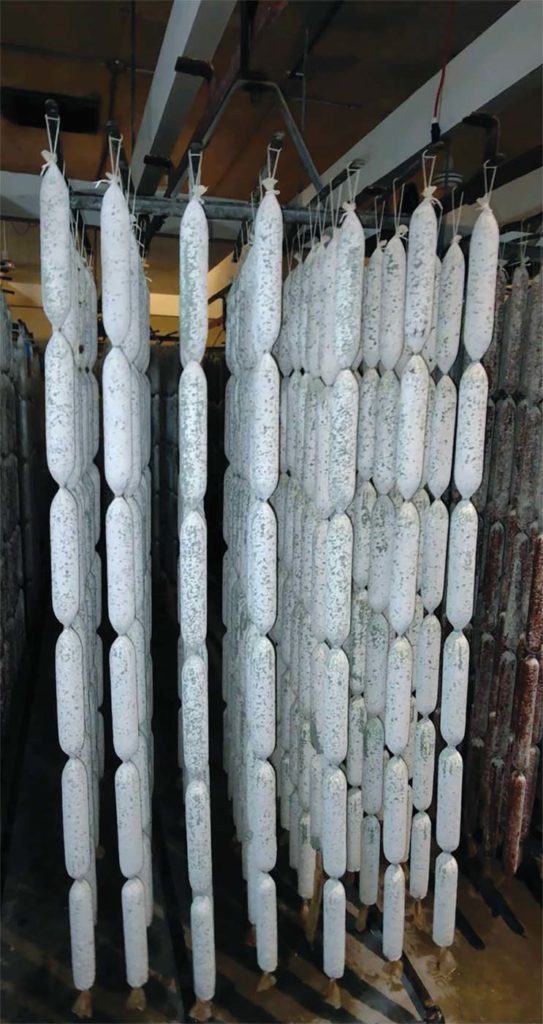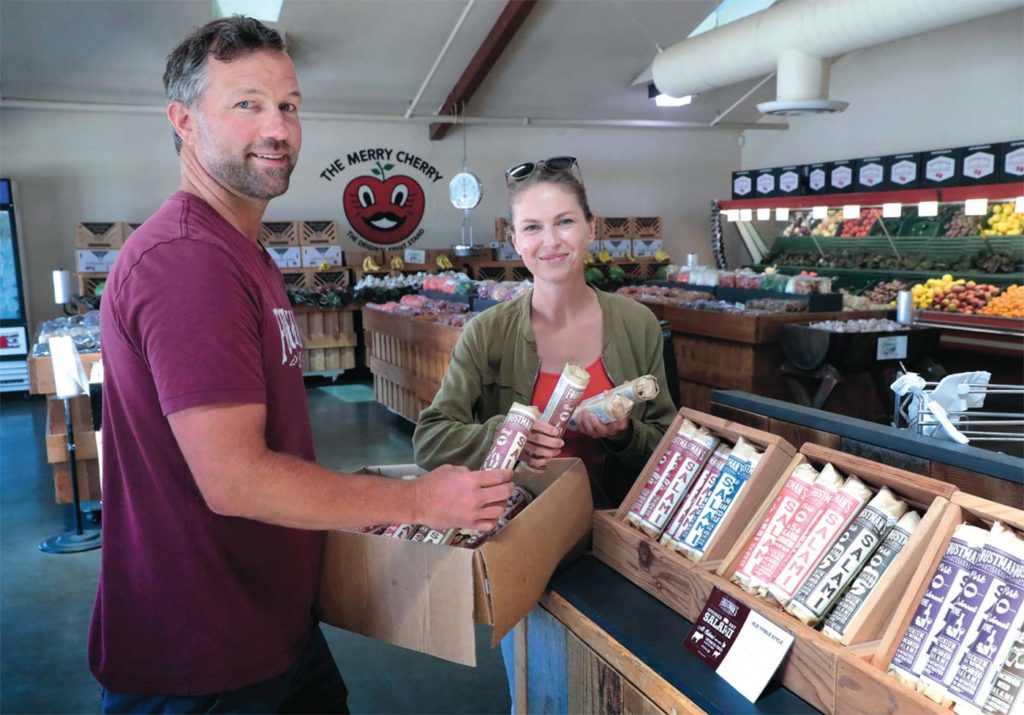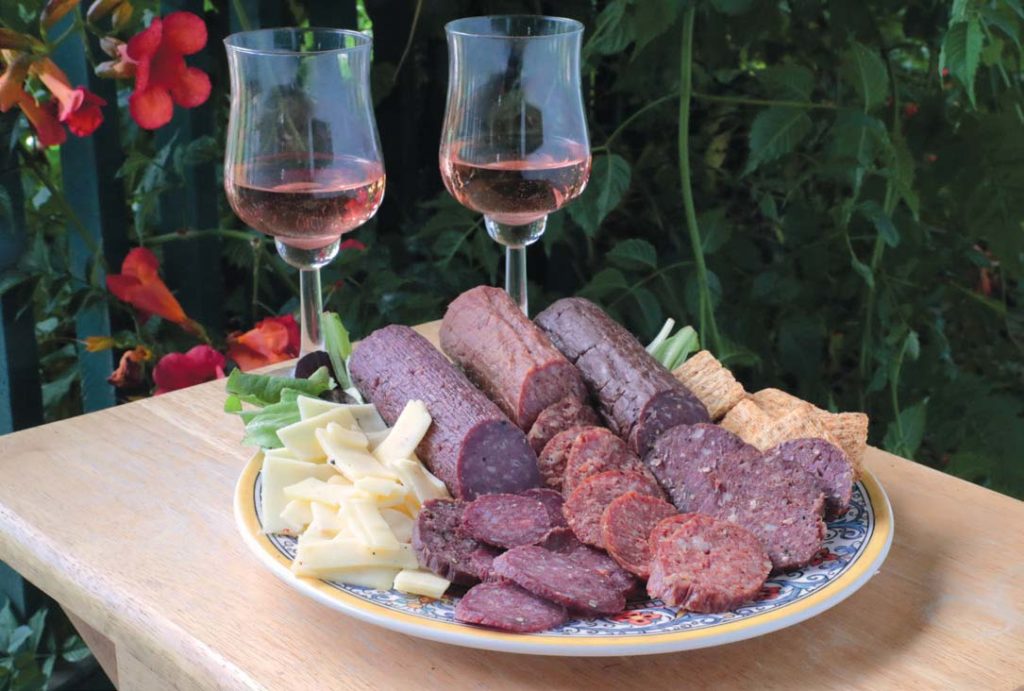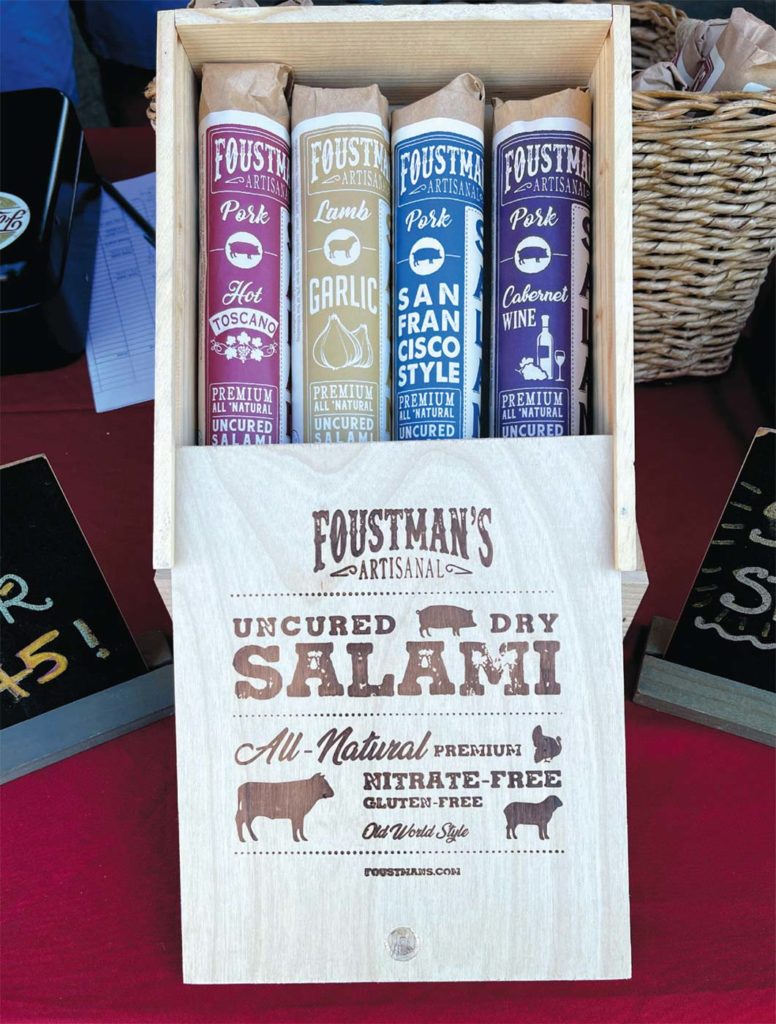PHOTOGRAPHY BY ROBERT ELIASON

Everything about Foustman’s uncured dried salami is distinctive, from the variety of base meats and styles to its retro-hip packaging and marketing strategy. Owners Jessica and Justin Foust have found ways of combining beef, lamb, pork and turkey with garlic, fennel, black pepper, habaneros, red wine and other natural ingredients to redefine the classic San Francisco staple in a way that has brought them an ever-expanding customer base.
“I grew up in Santa Cruz and we always had San Francisco-style salami on sourdough with a slice of cheese,” says Jessica. “It’s a childhood memory, and that is where my heart is. It is a great product and a perfect fit for us.”
Jessica’s father, Mark Holsman, owned the Cheese Connection in Soquel. When he retired, they took over the business, and decided to create their own brand and product.
Salami was also a very good fit for Justin. His grandfather, Fred Moro, was a member of the Santa Cruz Marconi Civic Club and as a child Justin accompanied him on weekend trips to San Francisco.
“My grandfather’s side job was to go up to The City and pick up salami, which he would deliver down the coast from San Francisco to Santa Cruz,” he says. “I would go with him and meet all these old Italians, who introduced me to salami and prosciutto. When we were deciding what to make, salami was always at the top of the list, with my childhood memory of salami sandwiches with pepperoncini.”
Coming up with the name for the product was easy: Foustman’s combines Justin’s last name with the last part of Jessica’s maiden name. The next step was to find manufacturing partners, and the Fousts relied on a family business that had worked with her father at his shop.


We are currently playing around with a Bloody Mary salami, with maybe some bacon in it, and one for Thanksgiving, something like a sage-cranberry turkey salami
“We went to them because they have been making salami for four generations,” Jessica says. “They have the expertise, and we were able to develop our recipes with them and go into production right away.” Foustman’s launched with six varieties of salami and pepperoni, producing about 300 pieces a month and selling at just one venue. They’ve increased production to about 10,000 salamis a month with flavors that include Pork, Fennel and Pepper, Lamb Rosemary, and Pork and Beef Pepperoni.
“We started with just the Alvarado Street farmers’ market,” Jessica says. “We would bring about six of each of our six flavors, and we would sell out. Now we do four farmers’ markets a week, we have 14 flavors and we have to bring about 30 of each to cover the demand.”
Foustman’s growth has been organic, relying on word of mouth and selling mostly in small venues, like fairs and markets, and independent stores like Garlic World in Gilroy, which has been stocking the sausage for a year and a half.
“Foustman’s is really starting to gain ground with our customers,” says Garlic World owner Brian Oteri. “We originally had them in the back of the store but moved them up front and center at the counter. The packaging is top-notch, the flavors are phenomenal and they keep coming up with new ones. It is a great gourmet, independently made sausage.”
Headquartered in San Juan Bautista, Foustman’s makes its salami in a USDA-approved commercial kitchen in Oakland, where there is a temperature-controlled room for fermenting and curing the Californiasourced meat. The entire process takes anywhere from two and a half to three weeks, depending on the moisture content.
“It takes less time than you would think, by the look of all the mold all over them.,” Justin says. “But that is one of the good things about it—you can get a good shelf-stable product in a short time.” The Fousts rotate their flavors and are always thinking about new ways to make their product.

“We are working on lamb with Middle Eastern spices,” Justin says. “But we haven’t gotten the spice level right yet. We are currently playing around with a Bloody Mary salami, with maybe some bacon in it, and one for Thanksgiving, something like a sage-cranberry turkey salami. We had one customer suggest putting orange zest in salami, and we are wondering how we can do it.”
Sometimes, their creativity pushes the envelope a little too far. Justin says they developed one hot salami that was like Ghost Pepper chicken wings. “It made your face feel on fire for about ten minutes after eating it,” he says.
One recent success is a salami made with beer, which has made the Fousts interested in collaborating with local breweries.
“I would like to see us do limited edition salamis,” he says. “We could do them in batches of 300 or so. You could have it at your brew house to slice up and sell, and we could also sell it on our end to promote the brewer.”
As demand continues to grow, the Fousts are regrouping a bit while they consider expanding.
“When we started, we didn’t know what we were doing,” Justin says. “We wanted to keep it small and independent. We have been approached by bigger stores like Safeway, but they would have taken all the salami we have ever made. We would really have to consider the rent on a new facility and the other costs of meeting that kind of demand.”
Having spent the past five years at farmers’ markets growing their customer base, Jessica would like to keep the chain stores out of things for now.
“I would rather work with little grocery stores and wineries,” she says. “I think more and more people want to buy from independent retailers. Vendors are reaching out to us from all over the country, and we may become national just that way. We think our product is a perfect fit for these small, unique places where you can talk face to face with the owners and the customers. It is very satisfying, and making them happy makes us happy.”
FOUSTMAN’S SALAMI
foustmans.com
About the author
Robert Eliason is a documentary photographer and photojournalist and has been based in San Juan Bautista for the last 12 years. Recently he has been doing extensive reporting on the wineries, breweries and specialty food companies of San Benito County, and is documenting the history of the Cienega Valley wine region.
- Robert Eliasonhttps://www.ediblemontereybay.com/author/kfeldmanklein/
- Robert Eliasonhttps://www.ediblemontereybay.com/author/kfeldmanklein/
- Robert Eliasonhttps://www.ediblemontereybay.com/author/kfeldmanklein/
- Robert Eliasonhttps://www.ediblemontereybay.com/author/kfeldmanklein/



